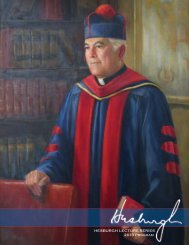HESBURGH LECTURE SERIES 2012 Program - Alumni Association ...
HESBURGH LECTURE SERIES 2012 Program - Alumni Association ...
HESBURGH LECTURE SERIES 2012 Program - Alumni Association ...
You also want an ePaper? Increase the reach of your titles
YUMPU automatically turns print PDFs into web optimized ePapers that Google loves.
Mary Ann McDowell, Ph.D.<br />
Associate Professor, Biological Sciences<br />
Biography<br />
Mary Ann McDowell is an associate professor in the Department of Biological Sciences at the<br />
University of Notre Dame. In addition, she is the chair of the Faculty Advisory Committee<br />
of the Eck Institute for Global Health. She obtained a B.S. and M.S. from the University of<br />
Nebraska and her Ph.D. from the University of Wisconsin-Madison. After a post-doctoral<br />
fellowship at the National Institutes of Health, Dr. McDowell joined the Notre Dame faculty in<br />
2001.<br />
The teaching and research interests of McDowell focus on the immunobiology of infectious<br />
diseases. Her current research program primarily focuses on two vector-transmitted diseases:<br />
leishmaniasis and malaria. McDowell has published in a variety of international journals and<br />
has received funding from the National Institutes of Health, the Department of Defense, and<br />
the American Heart <strong>Association</strong>.<br />
Lectures<br />
Fighting for Global Health: The Eck Institute for Global Health<br />
Infectious diseases account for more than 13 million deaths annually worldwide, being responsible for one in every two deaths<br />
in developing nations. Moreover, infectious diseases contribute substantially to slow economic and social progress in these<br />
countries. Notre Dame’s Eck Institute for Global Health is a University-wide enterprise that recognizes health as a fundamental<br />
human right and endeavors to promote research, training and service to advance health standards for all people in low and<br />
middle-income countries, who are disproportionately impacted by preventable diseases.<br />
Hijacking Immune Cell Machinery: Leishmania Parasites and the Intracellular Niche<br />
The hallmark of an intracellular parasite is its ability to survive within the intracellular niche. These organisms must be resistant<br />
to, or able to evade, the host cell’s microbicidal mechanisms. This dilemma is particularly relevant to Leishmania parasites<br />
because these organisms primarily reside within vertebrate immune cells, the main functions of which are to destroy foreign<br />
material and activate immunity.<br />
The Unholy Trinity: Vector, Parasite, Host<br />
The emergence of political terrorism in the U.S. and the increasing involvement of U.S. military in regional conflicts has<br />
significantly increased the risk to U.S. civilians and military personnel of infectious diseases associated with bioterrorism and<br />
warfare. Especially important as current and potential health risks are insect-borne diseases, like malaria and leishmaniasis.<br />
Successful control strategies to combat these devastating diseases will undoubtedly be multi-factorial, combining attacks on<br />
human infections and targeting diverse aspects of pathogen biology.<br />
68 The Hesburgh Lecture Series, <strong>2012</strong> <strong>Program</strong><br />
Categories<br />
Notre Dame, Science



